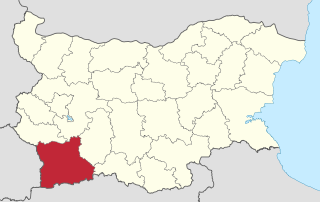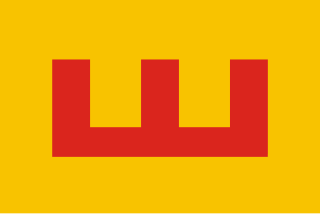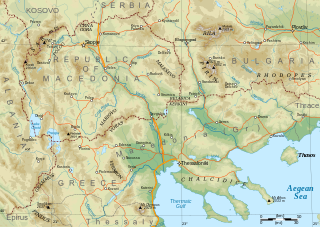
Macedonia is a geographical and historical region of the Balkan Peninsula in Southeast Europe. Its boundaries have changed considerably over time; however, it came to be defined as the modern geographical region by the mid 19th century. Today the region is considered to include parts of six Balkan countries: Greece, North Macedonia, Bulgaria, Albania, Serbia, and Kosovo. It covers approximately 67,000 square kilometres (25,869 sq mi) and has a population of 4.76 million.

The Second Balkan War was a conflict which broke out when Bulgaria, dissatisfied with its share of the spoils of the First Balkan War, attacked its former allies, Serbia and Greece, on 16 (O.S.) / 29 (N.S.) June 1913. Serbian and Greek armies repulsed the Bulgarian offensive and counter-attacked, entering Bulgaria. With Bulgaria also having previously engaged in territorial disputes with Romania, this war provoked Romanian intervention against Bulgaria. The Ottoman Empire also took advantage of the situation to regain some lost territories from the previous war. When Romanian troops approached the capital Sofia, Bulgaria asked for an armistice, resulting in the Treaty of Bucharest, in which Bulgaria had to cede portions of its First Balkan War gains to Serbia, Greece and Romania. In the Treaty of Constantinople, it lost Edirne to the Ottomans.
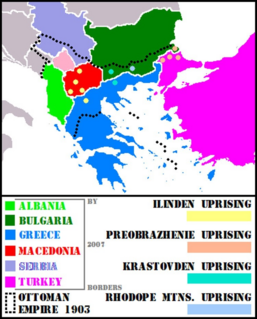
The Ilinden–Preobrazhenie Uprising or simply the Ilinden Uprising of August 1903, was an organized revolt against the Ottoman Empire, which was prepared and carried out by the Internal Macedonian-Adrianople Revolutionary Organization. The name of the uprising refers to Ilinden, a name for Elijah's day, and to Preobrazhenie which means Transfiguration.
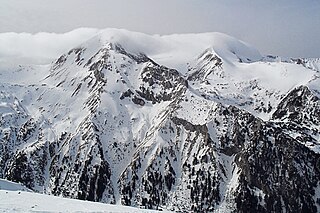
The Pirin Mountain are a mountain range in southwestern Bulgaria, with Vihren at an altitude of 2,914 m being the highest peak. One hypothessis is the mountain was named after Perun, the highest god of the Slavic pantheon and the god of thunder and lightning. Another version is that the etymology of the range derives from the Thracian word Perinthos, meaning "Rocky Mountain".

The Macedonian-Adrianopolitan Volunteer Corps was a volunteer corps of the Bulgarian Army during the Balkan Wars. It was formed on 23 September 1912 and consisted of Bulgarian volunteers from Macedonia and Thrace, regions still under Ottoman rule, and thus not subject to Bulgarian military service.

Moschochori ; ; ; was a small village in the community of Krystallopigi, Greece. Its population was 488 at the 1940 census.

Barakovo is a village in Kocherinovo Municipality, Kyustendil Province of southwest Bulgaria. As of 2013, it had a population of 468. It is situated at the western foothills of the Rila Mountains on the banks of the Rilska River. Between 1974 and 1991 it was administratively a neighbourhood of the town of Kocherinovo.

Georgi Stoyanov Todorov was a Bulgarian general who fought in the Russo-Turkish War (1877–1878), Serbo-Bulgarian War (1885), Balkan Wars (1912–1913) and First World War (1914–1918).
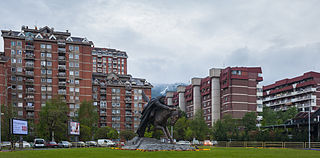
Vasil Hristov Chekalarov or Vasil Tcakalarov was a Bulgarian revolutionary and one of the leaders of Internal Macedonian-Adrianople Revolutionary Organisation in Macedonia. H. N. Brailsford described Chekalarov as the "cruel but competent general" of the Bulgarian insurgents in Macedonia. In North Macedonia he is considered ethnic Macedonian.
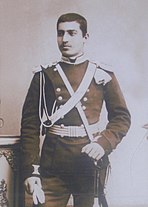
Petar Georgiev Darvingov was a Bulgarian officer, revolutionary and military historian, corresponding member of Bulgarian Academy of Sciences from 1932.

Southern Bulgaria is the southern half of the territory of Bulgaria, located to the south of the main ridge of the Balkan Mountains which conventionally separates the country into a northern and a southern part. Besides the Balkan Mountains, Southern Bulgaria borders Serbia to the west, the Republic of Macedonia to the southwest, Greece to the south, Turkey to the southeast and the Bulgarian Black Sea Coast to the east.
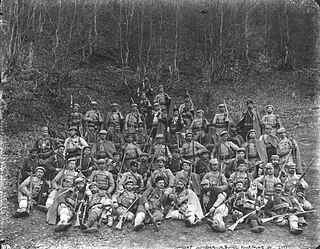
Petar Dimitrov Angelov was a Bulgarian military officer and a revolutionary, a member of the Internal Macedonian-Adrianople Revolutionary Organization (IMARO).
The Battle of Merhamli was part of the First Balkan War between the armies of Bulgaria and the Ottoman Empire which took place on 14/27 November 1912. After a long chase throughout Western Thrace the Bulgarian troops led by General Nikola Genev and Colonel Aleksandar Tanev surrounded the 10,000-strong the Kırcaali Detachment under the command of Mehmed Yaver Pasha. Attacked in the surrounding of the village Merhamli, only a few of the Ottomans managed to cross the Maritsa River. The rest surrendered in the following day on 28 November.
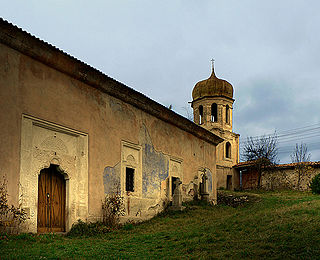
Golema Rakovitsa is a village in western Bulgaria, part of Elin Pelin Municipality, Sofia Province.

Belevehchevo is a village in Sandanski Municipality, Blagoevgrad Province, south-western Bulgaria and as of 2013 has only 1 inhabitant. It lies at the south-western foothills of the Pirin mountains facing the Sandanski-Petrich Valley. It is located at about 1 km east of the municipal centre Sandanski and some 124 km south of the national capital Sofia.
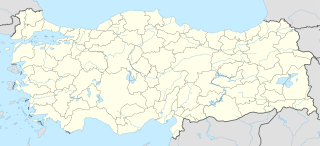
Dereköy is a village of Kırklareli Province in western Turkey and one of the three land border crossing points between Bulgaria and Turkey.
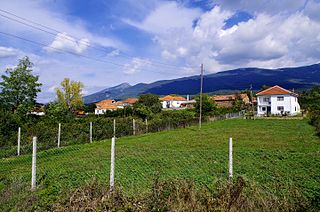
Asamati is a village in the Resen Municipality of the Republic of Macedonia, on the northeastern shore of Lake Prespa. Asamati is located just over 12 kilometres (7.5 mi) from the municipal centre of Resen and has 175 residents.

Buranovo is a village in Kocherinovo Municipality, Kyustendil Province, south-western Bulgaria. As of 2013 it has 152 inhabitants. It is situated close to the right bank of the Struma River just south of the village of Borovets, at some 2 km to the north-west of the municipal centre Kocherinovo.

Dragodan is a village in Kocherinovo Municipality, Kyustendil Province, south-western Bulgaria. As of 2013 it has 94 inhabitants. It is situated close to the right bank of the Struma River to the north of the village of Borovets, at some 2 km to the north-west of the municipal centre Kocherinovo.



